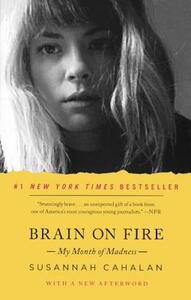Take a photo of a barcode or cover
challenging
hopeful
informative
medium-paced
Interesting story. Lots of info about the complicated health issues that made this feel more clinical than emotional.
informative
inspiring
medium-paced
challenging
dark
emotional
tense
slow-paced
A harrowing account of Susannah’s fight with a rare autoimmune condition that changed her entire life for a significant period of time. Some chapters were a bit slow, but overall a memorable listen.
informative
medium-paced
An excellent read of some hard topics.
challenging
dark
emotional
hopeful
informative
inspiring
reflective
sad
medium-paced
challenging
dark
emotional
informative
mysterious
reflective
tense
fast-paced
I did like the "whole body healthcare" message near the end after she talked about her recovery. There are so many ways the body can send a "distress signal" that can look one way but actually mean something else. The current way healthcare is set up by separating mental and physical health does such a huge disservice to the patients and means the doctors have gaps in knowledge.
I also liked that the author acknowledged her privilege of coming from a well-off family and having such a strong support system and how many patients needlessly fall through the cracks because of the way the healthcare system and insurance is set up. I'm glad that she was able to share her story and it's unfortunate how many are unable to because they are failed by the system along the way.
I also liked that the author acknowledged her privilege of coming from a well-off family and having such a strong support system and how many patients needlessly fall through the cracks because of the way the healthcare system and insurance is set up. I'm glad that she was able to share her story and it's unfortunate how many are unable to because they are failed by the system along the way.
Loved! Psychology, mental illness, human behavior, the brain... they have always interested me... probably stemming from my diagnoses with a rare childhood disorder (not what Susannah had). This book hit close to home and I can't help but love her perspective on everything but also the input from those around her as she went through this monstrous disease 💗
I may have cried once or twice while reading 🤷🏻♀️
I may have cried once or twice while reading 🤷🏻♀️
hopeful
informative
mysterious
sad
fast-paced
challenging
hopeful
informative
inspiring
medium-paced
Many people who have read this book say it is excellent, I agree. I love the fact that Susannah did not only explain the scientific and neurological side of the disease, but also explained how it affected her and the people she knew. “It is too often the author spends far too much time painting themselves in the best possible light and/or justifying their behavior. It is a rare and gifted author that can objectively describe a personal event without influencing it with strong emotions.”, said Nancy in her book review of Brain on Fire.
I would recommend this book to anyone who has an interest in psychology, neurology, enjoys reading memoirs, or wants to learn about a medical miracle. There were many strengths in this amazing book. She described the different medical terms so that they were easily understood, without getting too technical. Even though this was a memoir, every page and chapter seemed to end with a page-turning cliffhanger. Her writing is excellent, probably because she works for the New York Post. I thought it was interesting how in the beginning of the book she said that she only had fragments of memories from the time she was in the hospital and how she had to go back and interview doctors, nurses, neurologists, and watch the surveillance videos to fully gain enough of an understanding of what went on for the duration of her hospital stay. I also watched her TED Talk where she explained her miracle diagnosis, showed the clock drawing, and videos from when she was in the hospital. Here is the link to her TED Talk: https://www.youtube.com/watch?v=bQvqAaOLBnw There weren't really any weaknesses within the book. I was confused on a few of the medical terms at first, but as I kept reading, she would explain them very clearly.
I would recommend this book to anyone who has an interest in psychology, neurology, enjoys reading memoirs, or wants to learn about a medical miracle. There were many strengths in this amazing book. She described the different medical terms so that they were easily understood, without getting too technical. Even though this was a memoir, every page and chapter seemed to end with a page-turning cliffhanger. Her writing is excellent, probably because she works for the New York Post. I thought it was interesting how in the beginning of the book she said that she only had fragments of memories from the time she was in the hospital and how she had to go back and interview doctors, nurses, neurologists, and watch the surveillance videos to fully gain enough of an understanding of what went on for the duration of her hospital stay. I also watched her TED Talk where she explained her miracle diagnosis, showed the clock drawing, and videos from when she was in the hospital. Here is the link to her TED Talk: https://www.youtube.com/watch?v=bQvqAaOLBnw There weren't really any weaknesses within the book. I was confused on a few of the medical terms at first, but as I kept reading, she would explain them very clearly.






